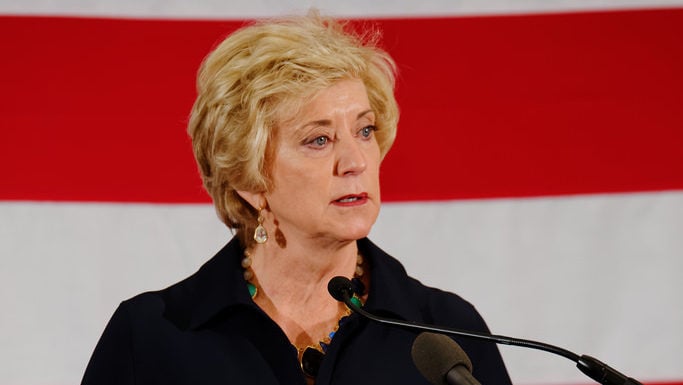President-elect Donald Trump has chosen former CEO and co-founder of World Wrestling Entertainment (WWE) Linda McMahon to oversee the U.S. Small Business Administration.
Ms. McMahon, along with her husband Vince, established what is now known as WWE in 1980 and has grown the company to a market capitalization of approximately $1.5 billion according to their website. She served as CEO for 12 years, stepping down in 2009. The sports entertainment company has given rise to superstars such as Hulk Hogan, ‘Macho Man’ Randy Savage, and Dwayne ‘The Rock’ Johnson.
The McMahon’s have remained close friends with Donald Trump and have donated millions to a Super PAC supporting his candidacy (though Ms. McMahon initially supported New Jersey governor Chris Christie).
Donald Trump himself even tossed his hat into the squared circle. In 2007 he took on and defeated Vince McMahon in a WWE ‘Battle of the Billionaires’, with the loser being ‘forced’ to shave his head (Linda did not participate).
Soon after her stint as CEO, Ms. McMahon delved into politics. She ran unsuccessful bids in 2010 and 2012 for a Connecticut U.S. Senate seat, running as a Republican. Perhaps most memorable and widely reported about those runs were the $100 million she burned through from her personal savings.
The Wall Street Journal recently noted that McMahon has shown interest in consolidating the SBA into the Commerce Department and eliminating the cabinet seat she is slated to hold. This move was proposed by the Obama administration in 2012 but has since stalled.
The SBA was created in 1953 during the Eisenhower administration and its mission “is to aid, counsel, assist and protect the interests of small business concerns, to preserve free competitive enterprise and to maintain and strengthen the overall economy of our nation.”
The agency is primarily known to act as a partial guarantor of business loans and has only held Cabinet-level status during the last 2 Democratic administrations. It has an annual budget of more than $700 million.
The 2008 financial crisis brought with it a natural tendency of lenders to be more risk-averse with loans. Many Keynesian economists considered the higher lending standards a ‘freeze’ that had to be thawed as quickly as possible. As a result, the SBA was given broader authority to underwrite a larger portion of loans, up to 90 percent, transferring more risk from banks to taxpayers. This practice was extended with the Small Business Jobs Act of 2010.
However, as highlighted by Peter Klein of the Mises Institute, a 2014 paper by the National Bureau of Economic Research concluded that SBA loans effectively reduced economic growth. The paper suggests that SBA-guaranteed loans allocated to politically favored groups like women, minority, and veteran-owned businesses come at the expense of more innovative and profitable companies that are likely to generate the most economic growth.
Assuming Ms. McMahon’s appointment to the SBA is confirmed by Congress, she will bring with her a resume that also includes co-founding Women’s Leadership Live, a company providing events and support for women business owners and entrepreneurs. She also sits on the boards of several nonprofits that support returning veterans and active-duty military members.
In a statement on Donald Trump’s Facebook page, the President-elect says, “Linda will be a phenomenal leader and champion for small businesses and unleash America’s entrepreneurial spirit all across the country.”











